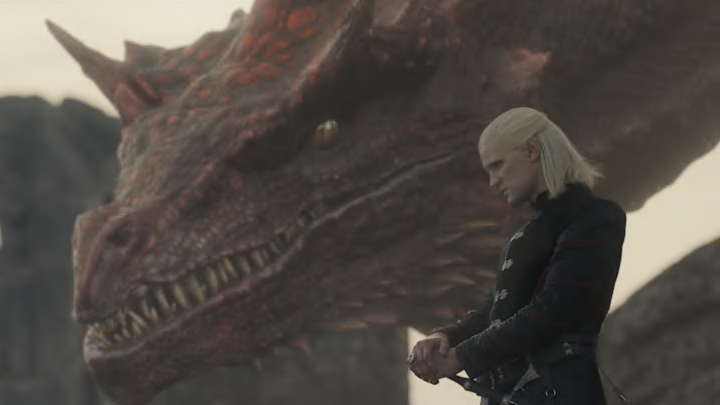Earlier this week, Colossal Biosciences revealed that they had brought the dire wolf — a species of enormous wolves that roamed the Americas thousands of years ago — back from extinction, despite the fact that they haven't been around since the end of the last ice age. It's one of those amazing feats of science that makes you pinch yourself.
The marketing also has something to do with that. Direwolves featured prominently in Game of Thrones, where each of the Stark children adopted one. Colossal knew that, so it photographed the first two dire wolves it cloned — brothers named Romulus and Remus — on the Iron Throne:
Scientists revived dire wolves, which have been extinct for thousands of years, and then photographed them on the Iron Throne: pic.twitter.com/MqLgqEcO3f
— Winter is Coming (@WiCnet) April 7, 2025
So if Colossal has brought one Game of Thrones creature into the real world, could it create others? CBR asked co-founder and CEO Ben Lamm the question on everyone's minds: are you gonna make a dragon? "So I don't know what conservation benefit there is, but you have dragons in so many different cultures that were not connected via landmass and have separation. So it is very, very interesting to see the connection to dragons. But there's no definitive proof like there are dinosaurs that dragons ever truly existed. Right? So I don't know if it falls in the world of de-extinction, I do think, from a synthetic biology perspective, being able to, not today, but at some point in the future, you will be able to make things like that," Lamm said.
So Lamm sees the role of Colossal Biosciences as bringing back animals that have gone extinct, as well as saving animals that on the verge of extinctions: in addition to creating new dire wolves, Colossal has also cloned a few red wolves, an endangered species. Since dragons were never real, creating one would be outside of the company's purview.
But is is possible? Lamm doesn't think it is...yet. "We, as humanity, will have the technologies when you combine access to compute AI, eventually, quantum, and synthetic biology. Then you'll be able to engineer a lot of really crazy things like Banthas from Star Wars or dragons," he said. "I'm not saying you should. I'm just saying I do think that in the next 20-30 years, technology will probably exist based on the current course and speed. I mean, we are arguably the most advanced synthetic biology company and genetic engineering company in the world. I don't think that we could pull it off, even if we put all systems on it. But I do think eventually that technology would exist. Right now, we all really need to focus on de-extinction and species preservation. And once we've got this really honed, we can probably have more conversations, but right now, you know, I think I mean I got chills and cried the first time I saw the Dire Wolves, so I'm still in disbelief."
Isn't Jurassic Park a disaster movie?
There are a couple of caveats to mention here. First, although everyone — including me — is selling this story as "dire wolves have been brought back from extinction" — there's a lot of dispute on that point. To pull off this feat, Colossal edited the genomes of modern-day grey wolves so the resulting puppies would resemble ancient dire wolves, which are bigger and stronger than pretty much any modern-day wolf. But there's a question of whether that really makes them dire wolves, or if Romulus, Remus and their sister Khaleesi are just variant grey wolves that kinda resemble what dire wolves used to be like.
Another question: does it make a difference? If it walks, acts and looks like a dire wolf, does it matter how we got there? I'll leave that to the bio-ethicists to discuss.
Colossal intends to try and bring back other extinct species like the Tasmanian tiger, the dodo bird and the wooly mammoth. Could it eventually try to bring back dinosaurs? And what is a dragon if not a mythic dinosaur?
If Colossal and other companies eventually can do that kind of stuff, should they? Do we want to live in a world occupied by dangerous apex predators wiped out millions of years ago, leaving room for us to rule the world? Do we want to create new ones? Doesn't this always end badly for the people in the Jurassic Park movies?
Bioethicists and cinephiles have a lot to talk about. If that's you, sound off in the comments.
To stay up to date on everything fantasy, science fiction, and WiC, follow our all-encompassing Facebook page and Twitter account, sign up for our exclusive newsletter and check out our YouTube channel.
